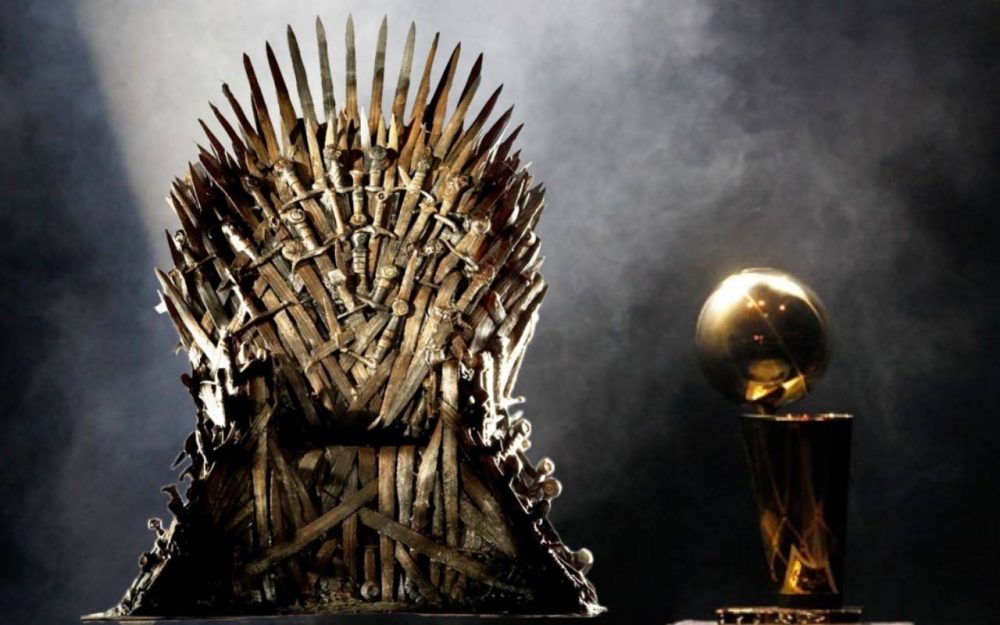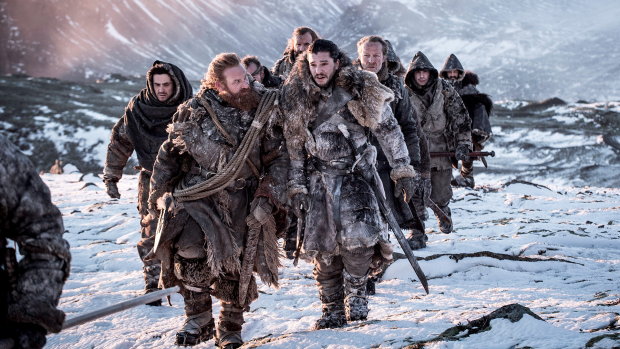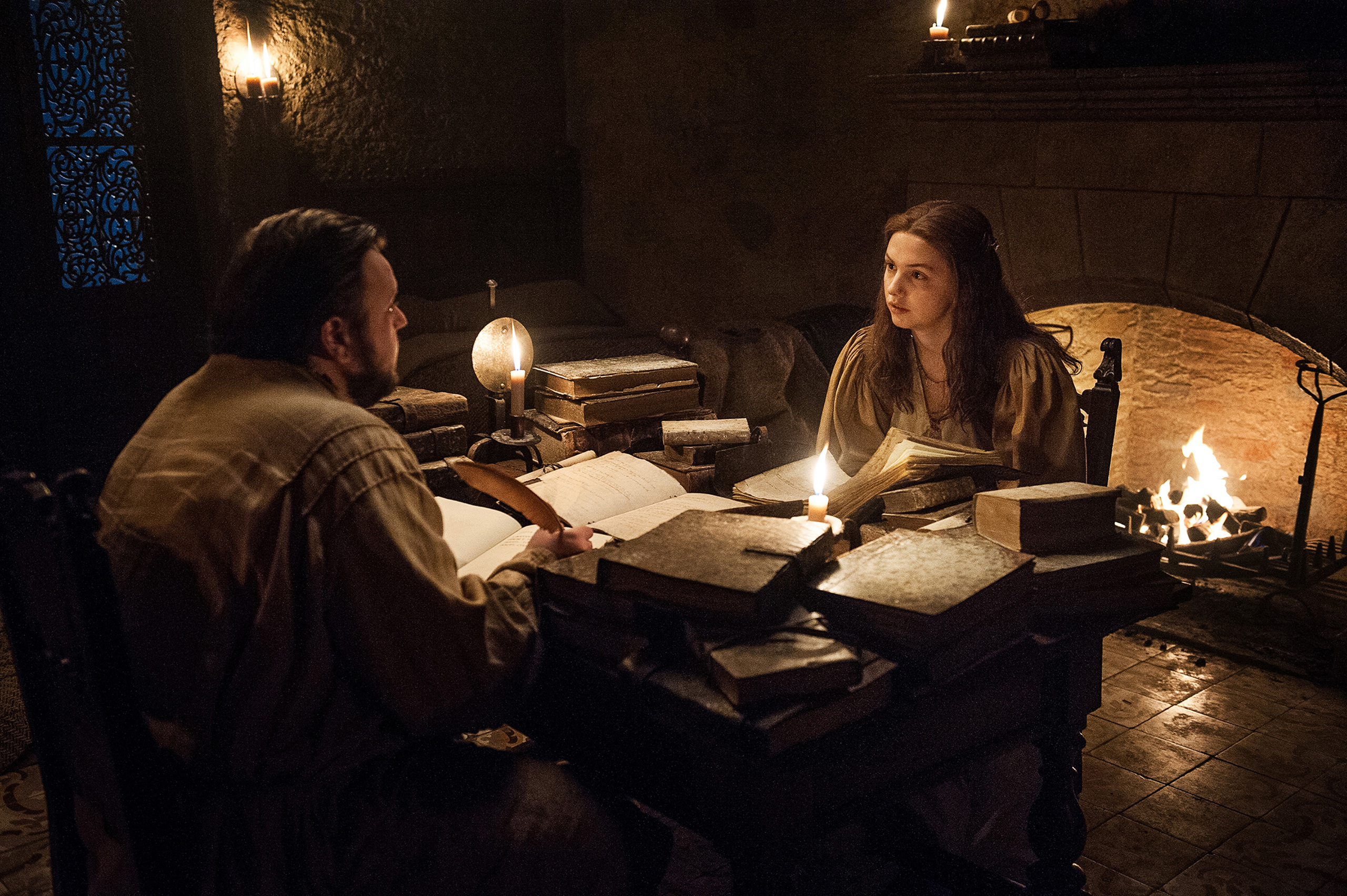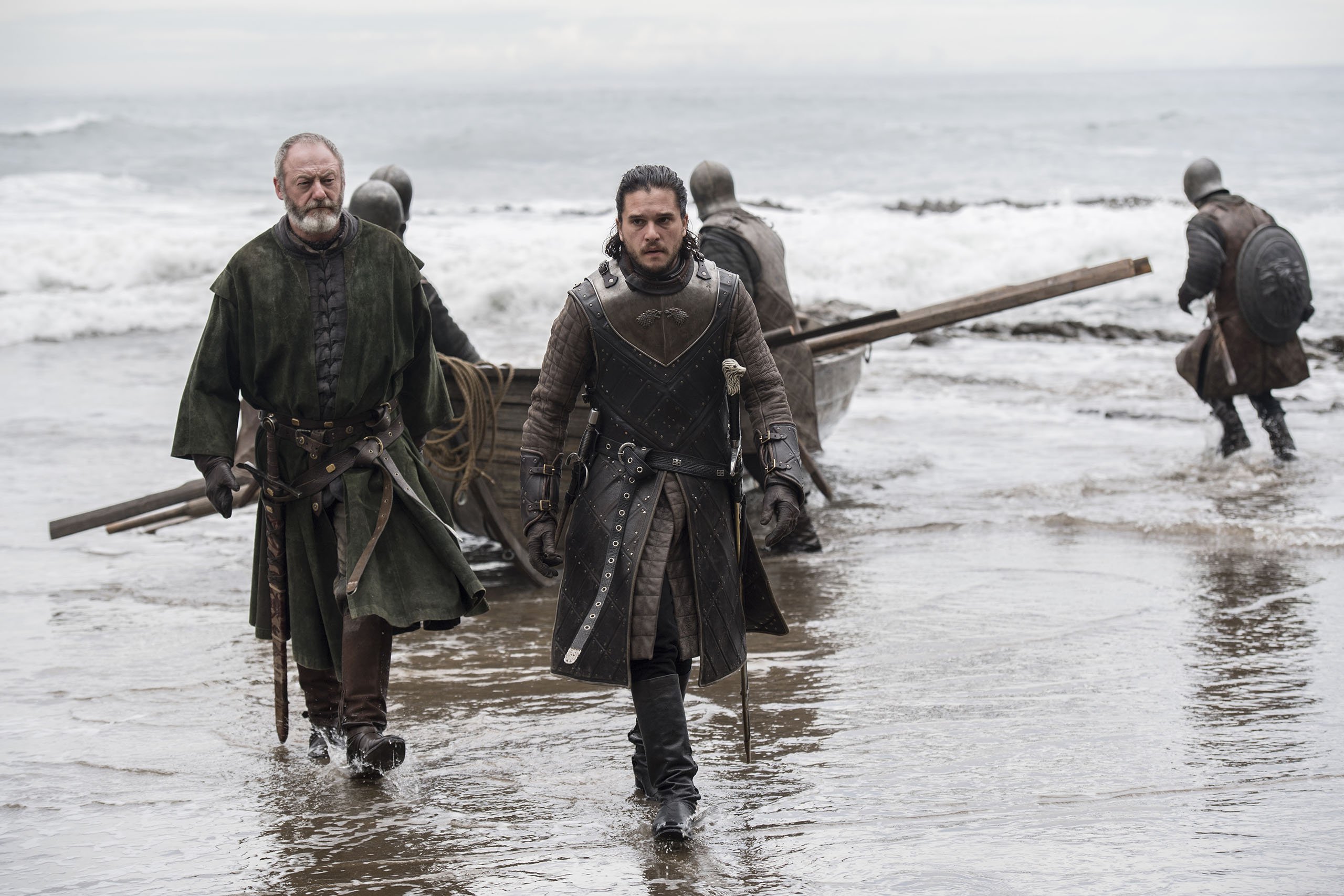
Season seven continues to unveil the physical and spiritual crossings. Whether it’s melding two ideologies or aligning two powers, we’re seeing the presence of powerful connectors, bridges that are not only being navigated, but built up and in turn torn down. Episode three, “The Queen’s Justice” illuminates the importance of their creation, destruction and reality of their metaphoric existence. Beginning with the union of fire and ice.
The episode opens with the Jon Snow landing on the sandy beaches of Dragonstone. Against the collective warning from his people and the past, he makes the southern journey with Ser Davos and a small collection of men. Greeted by a familiar face, Jon is met by a newly-scarred Tyrion Lannister, the queen’s trusted advisor, Missandei, and a group of Dothraki men. Immediately one can identify a trust shared between Jon and Tyrion, one with respect for one another. It is an important function in helping to make the meeting a reality, one that will be pivotal in forging two campaigns together in the hope for human survival.
From on high, Melisandre watches with satisfaction as The King in the North makes his way to the Mother of Dragons, Daenerys Targaryen. It’s clear she feels a deep sense of security in observing the result of her prophetic handling. Her moment of witness is cut short, however, as Lord Varys makes his way to her position on the cliff. The Spider, a clever man whose natural cynicism of sorcery heightens his perceptive gaze, knows there’s something to be learned from her absence from the pivotal arrival. As he taunts carefully, Melisandre admits to an ill-parting regarding her final moments with the Jon and Ser Davos. While not revealing specifics, she mentions the mistakes she’s made, how they’ve been horrifying, and how her time of whispering into the ears of kings has come to an end. Keep in mind the mention of king’s only, understanding that it’s mostly strong women now whose power steadily grows. Lord Varys, skeptical of her semantics as well as her intentions, inquires as to her journey going forward. After she reveals her plans to head to Volantis, he encourages her rather ominously to stay there. However serious his threat, the Red Witch, powerfully as ever, promises Lord Varys that she will be back.
“Oh I will return, dear Spider, one last time. I have to die in this strange country. Just like you.”
Melisandre holds the vision of the future, and like Jon, she’s no longer concerned over politics and noble positioning. Something has shifted inside her and a chilling calm has taken hold, one that makes her present journey and eventual death feel even more significant.
While a powerful force makes her way out of Dragonstone, another one makes his ingress. Jon Snow is led into the castle’s audience chamber, met by Missandei’s decadent introduction of Queen Daenerys. The lofty list of titles is returned with a much more simple, “This is Jon Snow. He’s King in the North” by Ser Davos. Their respective debuts showcase quite vividly the vast difference in their energy. The Mother of Dragons and Breaker of Chains is confident as ever in her immediate demand for Jon’s allegiance. She recognizes only the war of her own and her familial right to the Iron Throne. She denounces Jon’s claim to any northern kingship and demands he bend the knee.
This is of no interest to Jon, not because he has any personal desire for noble ascension, but because there’s no time for political declarations when death marches forward. While Daenerys attempts to convince Jon of her royal entitlement and the importance of her campaign, Jon continues to dismiss it all as frivolous, a reaction one may rightfully have after staring death itself in the face. The two are both revolutionaries and fight for moral balance, but their blind devotion to their own campaigns will be the downfall of everything. And despite the ironic reality of Jon’s true birthright to the Iron Throne as well, they’ll have to think larger, expand their narrowed vision in order to defeat a two-tiered monster attacking steadily from both sides.
Lord Varys enters, interrupting a seemingly futile exchange of ideals, to inform Daenerys of the attack to her Iron Fleet. Taken aback by the news, she dismisses her guests and asks for further elaboration on the damage. While she learns that only two or three ships escaped, inquiring if any Greyjoy remain living, Theon manages his own rescue as one of the last remaining vessels pulls him aboard. Albeit being shamed by the crew for abandoning Yara during Euron’s onslaught, Theon’s survival may prove to be more useful than anyone can discern at present moment. He carries with him a jewel of information in knowing that Yara, Ellaria, and Tyene are all still alive. And had he attempted a valorous fight against Euron, his efforts would have resulted in death to Yara and himself, making him as useless as everyone currently believes him to be now.
While Theon clings to life after defeat, Euron is spilling over with it as he parades through the streets of King’s Landing, prized captives in hand. Overflowing with not only life, but also maddening joy, Euron’s lust for power is driving him closer to his desires than ever before. As he pulls the prisoners through mobs of cheering common folk, he mentions to Yara that the attention is making him hard. Euron may turn out to be the most savage key player yet. And his lascivious, virile nature is proving to be as effective as it is powerful.
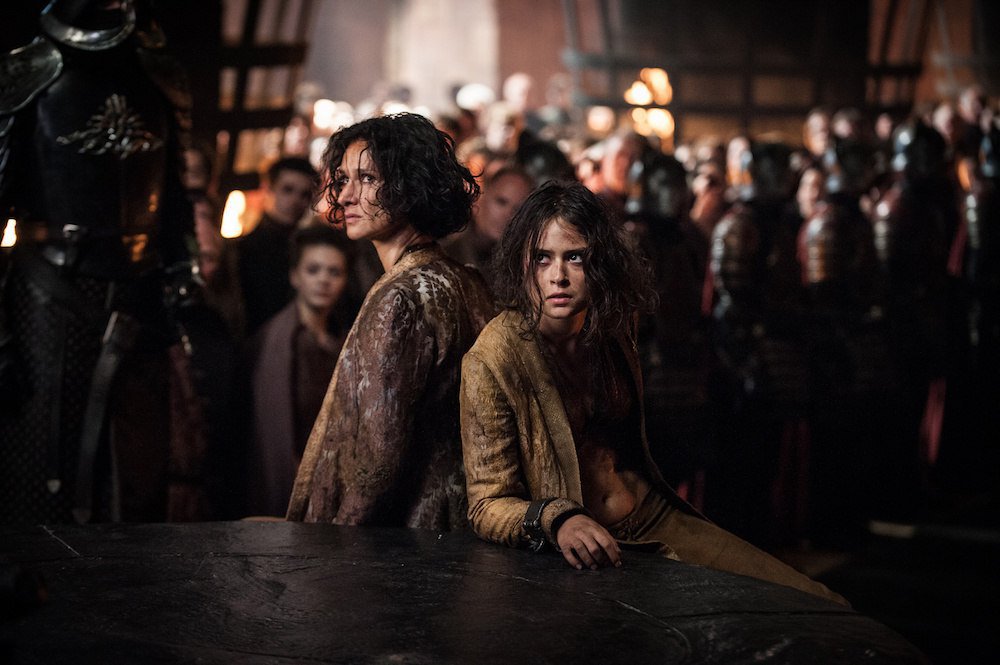
As Euron gallivants from the streets into the audience chamber, Cersei sits formidably on the Iron Throne. Adorned in a breathtaking black gown, she watches as the gift that was promised is delivered unto her feet – her precious Myrcella’s murderess presented to her intact, alive and with a daughter of her very own, Tyene. Cersei’s deep satisfaction is unmistakable and like Euron, she’s completely aroused by her prize. After deeming Euron the greatest captain on the 14 seas and a true friend to the crown, she vows to give him the ultimate reward in her hand… but only after the war is won. Jaime understands the political side, but can’t help but notice their concupiscent exchange during the process. The dynamic is powerful; Cersei and Euron have far more in common than anyone may have originally guessed. Their blind lust for the destruction of their enemies leaves them sexed-up after a slaughter, but this energy may prove to be a weakness, as it seems to be a shared force that cannot and will not be tamed.
Cersei wastes hardly any time before playing with her newfound present. After living with the riddled guilt of not being able to avenge the deaths of her children, she now has the ability to destroy the woman who took her favorite from her. As she speaks to both a gagged Ellaria and Tyene, her lips appear to be glowing a rose-colored pink. She’s incensed, but so deeply satisfied in the moment that her calm is steady and quite terrifying. She’s more coherent in these moments than in any other, proving that her sinister propensity is what’s most natural for her. She delivers to Tyene a poetic death by way of a poisonous kiss, leaving Ellaria alive to watch her daughter rot: a vicious eye-for-an-eye.
Although her council may be smaller than others, there’s no question that Cersei’s ability to maximize what she has is superior to all others. Qyburn, instrumental in creating the horror that is The Mountain (in current form), has been faithfully loyal, and procuring the poison Ellaria used on Myrcella was just another showing of his blind allegiance and talents. A long farewell delivered to Tyene so her mother can bare witness to her death for the rest of her days.
Like Euron, Cersei’s relishes the macabre victories in a completely salacious fashion. She thrusts herself into Jaime’s chamber after the murder and albeit a small objection from him at first, due in part from the displacement of his gold hand, she has him ready in just a few seconds. She envelops her brother, ripping his pants off, fervently pleasuring him. He wakes and stares at Cersei, post-coitally, and one must wonder if it’s in admiration, confusion, joy, dread, or all of them at once. Cerise has surely changed; perhaps as has Jaime.
Despite his objection, Cersei answers the handmaidens knock while Jaime lays naked in bed. The Queen of the Seven Kingdoms no longer has any reservations about doing what pleases her. She learns that a representative from the Iron Bank has since arrived and is waiting for a meeting with her. Unlike Daenerys so far, it seems as though Cersei is the one who’s embodying the spirit of the dragon, taking what’s hers and enjoying the process. The exhilarating rush of satisfaction has given her a newfound confidence that she’s using quite successfully in all aspects of her reign, including luring the Iron Bank’s loyalties to her side. Despite the crown’s massive debt, Cersei ensures the banker that regardless of the dragons, the burning of the Sept, or her temporarily lost allies, that she will in fact win this war and pay her debts, as Lannisters always do and have.
While things are moving fast in King’s Landing, the progress at Dragonstone seems to moving rather slowly. Jon has made no headway in his effort to rally forces against the Night King and Daenerys hasn’t gotten any closer to acquiring a new ally. The King in the North, now trapped on the island with both his ship and weapons confiscated, takes to a precipice to think on what can be done. Tyrion, who also has issues to brood over, finds Jon in the place where he’s gone to reflect. An exchange takes place here that does three very important things. One, Tyrion helps Jon to understand the queen’s position and why she’s responded the way she has, creating empathy for her cause. Second, Tyrion lets Jon know that he believes in him and understands the importance of his fight. The Queen’s Hand has a gift when it comes to bridging gaps, and through the trust of both Daenerys and Jon Snow, he has the greatest opportunity of aligning the two and fusing their respective wars. As a friend, Tyrion asks Jon if there’s anything he can do for him, and the dragonglass notion is finally introduced. This is the third result of an honest conversation between two men; perhaps, the most important of the three.
While feeling completely abashed in his belief of the threat beyond The Wall, Tyrion approaches Daenerys about the dragonglass. He uses sound logic in presenting an argument that favors giving the material to Jon so that he can mine it to make weapons. Tyrion points out that the dragonglass is useless to her and her campaign, noting that up until now, she wasn’t even aware of its presence. He states that by giving Jon the glass, which is essentially nothing to her, she’s helping sow the seeds of trust that will hopefully result in his allegiance later down the road.
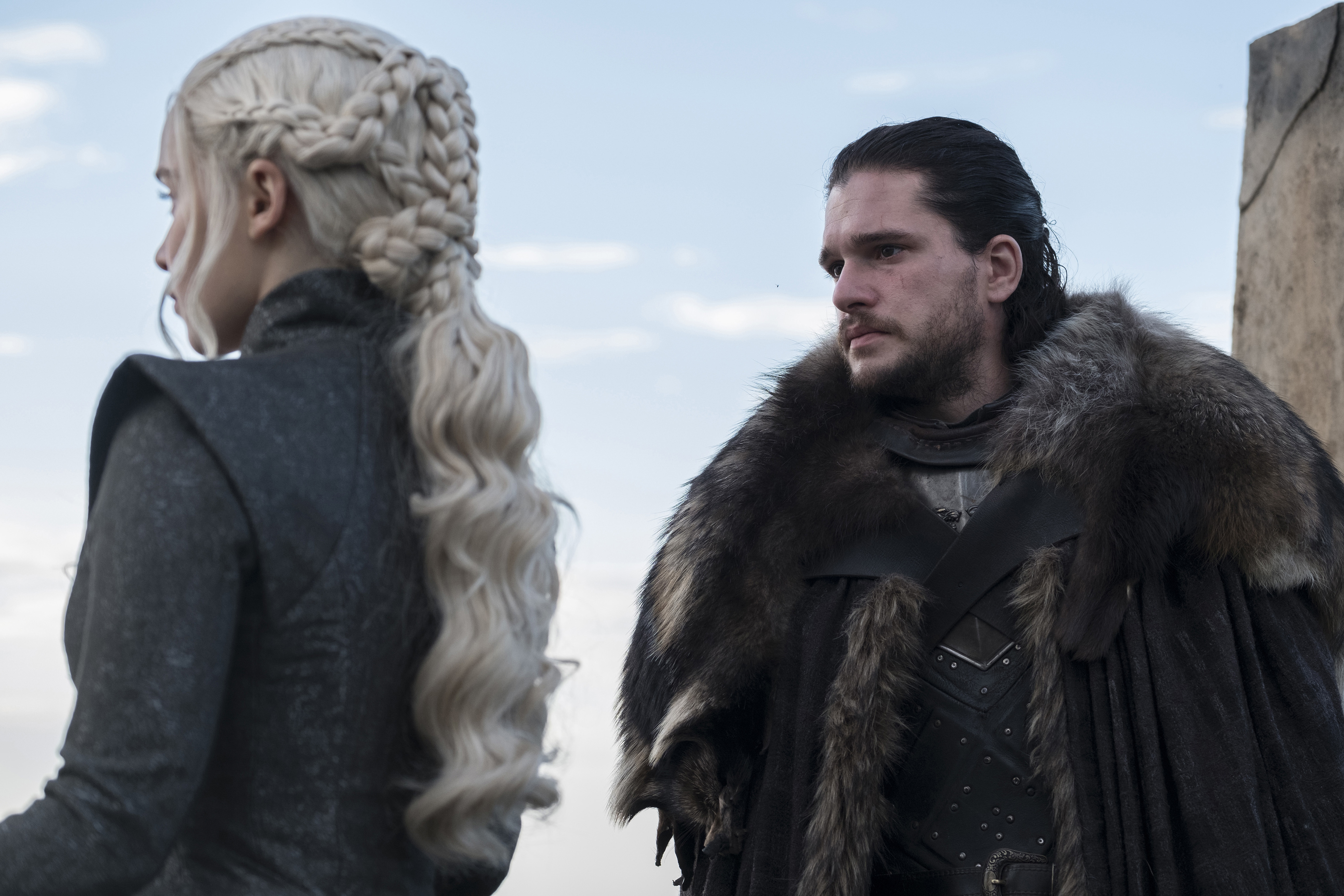
Shortly thereafter, Jon Snow approaches Daenerys as she watches her dragons soar over the high seas. She informs Jon that she will let him mine the dragonglass as well as provide him with any men and resources he needs for the process. He’s undoubtedly grateful and wonders if she believes in the Night King and the Army of the Dead. It’s unclear whether she does, but it seems they’ve reached the first moments of mutual respect and understanding. They both have witnessed things that were once believed to be mere fantasy, both have risked their lives for the good of their people, and have suffered serious loss. They have far more in common than they can imagine, including the blood that runs through their veins, but the discovery of these critical commonalities is moving at a snail’s pace while Cersei is mobilizing with ferocity and speed. Is this a step in the right direction? There’s no doubt. But dragons and wolves cannot be successful when operating like mares.
Meanwhile back in Winterfell, Sansa is showing a true propensity for command. Her leadership skills are sharp as she works out ways to feed the northern army and prepare them for the long war and winter ahead. As she strategizes, there’s mention of Maester Luwin’s records, and that he’s kept a copy of every raven scroll that’s ever passed through Winterfell. This is important to note, as there’s information within those records that can illuminate as well as expose. This in and of itself is a threat to Little Finger, the man who’s leaching next to Sansa’s side in an effort to provide a whole lot more to her than just counsel. While he does provide her with sound advice, advice to fight every enemy all the time, and to be boundless in her pursuits and knowledge, he’s committed many crimes against her and her family. And now runs a serious risk of being exposed.
Shortly after Little Finger’s aside, Sansa is informed that her presence is critical at the gate. An almost unfathomable sight awaits her as she sees her brother Bran for the first time in years. And while Sansa is enveloped with emotion, Bran, now carrying the burden of being the Three-Eyed Raven, is almost unfazed by their family reunion. They proceed to spend some time at the sacred Heart Tree where Sansa tries desperately to connect with her once lost brother. But Bran’s communications are cold and he hasn’t any time or purpose to explain his path to his sister. His need to speak with Jon is most pertinent and it’s almost trivial to try and convey mountains of information to her to help explain why he needs to see him or why he’s even there. What he does do, however, is show to Sansa in a very horrifying way, a small presentation of his power. Through siting moments of her nightmarish wedding to Lord Ramsay, Bran exhibits the sight, proving that he’s far more than Sansa could have ever imagined. Bran’s return to Winterfell represents the climate of the now. Nothing is what it once was. He knows things need to move much faster, both the development of his power, as well as current events and motives concerning his family.
While the cruel reality of winter sets in deep in the north, hope is illuminating from the south across the narrow sea. As we get a glimpse into the Citadel, we come to find Ser Jorah, whose skin, albeit scarred from Sam’s procedure, seems to be rid of the greyscale infection with his life preserved. Archmaester Ebrose is quite surprised by the recovery as he conducts his inspection. A rather endearing exchange takes place between he and Ser Jorah in where Jorah keeps Sam’s secret and explains that his affliction simply subsided, citing the rest was fortuitous, as well as the climate. A learned scholar, Archmaester Ebrose is no fool, and exits, but not before summoning Sam into his office for a talk later that evening. The two share a deep respect for each other. Sam owes his life to Jorah Mormont’s father and now Jorah owes his life to Sam. They share a handshake where their bare hands touch, symbolizing health, trust and friendship. Their connection is significant. Both men are intimately linked with their respective king and queen, two that need to unite just as their supporters and friends have done. Sam and Jorah may very well aid in this connection going forward.
Later in his office, Archmeaster Ebrose prods Sam about what he’s done. At first pointing out all the reasons he should have not underwent the procedure and all the rules ensuring against it. Although strict, it’s clear he’s not livid, and after a little dose of scolding, Ebrose leaves no doubt that he’s impressed with his young apprentice and notes that Sam himself should be very proud. Sam is achieving at a remarkable rate at the Citadel, and ironically enough, his quirky punishment is to copy a wealth of historical scrolls, being made privy yet again to resources of information. His growth as a seeker and protector of knowledge continues, and who knows what gems of insight he may find on his ironically assigned new task. It’s ironic that it’s the procuring of information that got him in trouble in the first place. But, perhaps it’s not irony, but simple harmony with what’s sure to come.
Ser Jorah will now make his way back to his Khaleesi, the woman who inspired him to live on. She’ll need all the counsel she can come by when he finally reunites with her as her plans have been failing at an alarming rate. As she discusses what to do about her decimated armada, the Unsullied make their approach to Casterly Rock. Daenerys, tired of the slow progress, suggests passionately that she destroy Euron’s fleet with the firepower of her dragons, an idea birthed from her own dragon within. She’s yet again advised against her instinctual feelings and told by her small council that she’s far too important to risk, as she herself would have to man Drogon in the open seas. Whether this plays into her ego or her fear is unclear, she dismisses the idea to inquire about the battle for Casterly Rock. Tyrion proceeds to explain the strategy in one view while the audience is privy to a juxtaposing window into the battle itself. The fortress isn’t as manned as everyone, particularly Tyrion, believed, and despite his aspiration to take territory that has never been taken before, the Unsullied succeed not because of military success, but because Casterly Rock wasn’t in fact taken – it was given to them.
In a chilling finale to the episode we see the bulk of the Lannister forces marching on an entirely unexpected target, the beautiful region of Highgarden. A place with not only control over the most plentiful resources in all seven kingdoms, but a site for incredible stores of gold. Cersei’s cunning, Euron’s naval command, and now Jaime’s military mind are proving a vastly superior force in the battle for the Iron Throne. By putting the experience of his defeat at Whispering Wood by Robb Stark to good use, Jaime devises a keen strategy of misdirection, leaving the not-so-important rock vulnerable as the perfect decoy to distract as they take territory of great value. Through the acquisition of Highgarden, they win the allegiance of the Iron Bank as they can now pay their debts, the loyalties of great houses, and their armies as they can now supply sustenance for the long winter ahead, while simultaneously destroying a house in open rebellion, crushing one of Cersei’s most hated enemies in the process.
Daenerys’ Unsullied army has now been cut down in vast numbers and her armada burns from the wrath of Euron’s fleet yet again. Casterly Rock as a grand decoy proved a double distraction resulting in heavy losses for Dany’s army and massive gains for Cersei’s empire. Lady Olenna, a prophet in her own right, advised Daenerys to listen to the dragon within, but as she waits in her castle to die, she knows that the Mother of Dragons didn’t heed her stern warning.
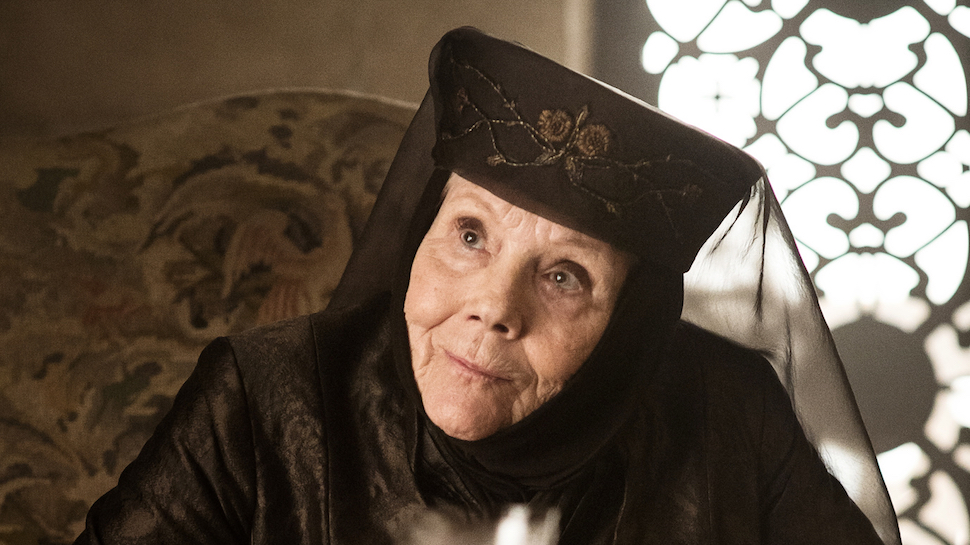
A victorious Jaime Lannister meets Lady Olenna in her chamber where she’s adorned in all black, still mourning the death of her family. The conversation that proceeds is of deep importance, particularly due to the uniqueness of the environment. They both know that only one of them is leaving the room alive, which makes the walls silent, a place where honest dialogue can exist freely. The matriarch of House Tyrell inquires initially as to why they took Highgarden over defending their family home. Jaime, because of this unique environment, reveals the strategy behind it. In this, the audience learns the larders have all been emptied at Casterly Rock, receiving confirmation that it was in fact Euron’s fleet that attacked the Unsullied ships during the strike, making the land rather useless and Daenerys’ army much smaller. After a few somewhat polite exchanges, Lady Olenna takes in the final moments of her death and she delivers what at first appears to be a confession of sorts, “I did unspeakable things to protect my family. All watched them being done on my orders. I never lost a night’s sleep over them. They were necessary. And whatever I imagined necessary for the safety of house Tyrell, I did.” Lady Olenna goes on to identify why Cersei won out, “But your sister, has done things, I wasn’t capable of imagining. That was my prize mistake, a failure of imagination. She’s a monster, you do know that.”
Jaime proceeds to defend his one true love and Olenna sees the truth in his heart, pitying him for his affliction, “You love her. You really do love her. You poor fool. She’ll be the end of you.”
Jamie admits almost lovingly to her statements as she asserts, “She’s a disease. I regret my role in spreading it. You will too.”
Now visibly shaken by her words, Jaime decides that it’s time for Lady Olenna to die. She wonders aloud the way in which he’ll deliver her death. He mentions Cersei had some horrifically grand ideas on how to kill her but that he talked her out of them. Jamie then reaches for a vile and pours the contents into a very grim glass of red wine. She asks if there will be pain, and Jamie, as noble as ever, ensures her that there won’t, that he personally saw that there wouldn’t be.
With her honor intact, Lady Olenna makes due of her final glass, touching her lips after the wine has disappeared from her cup. It’s within those final moments of life that she delivers a diatribe so powerful, that she ensures her own victory, even in death:
“I’d hate to die like your son, clawing at my neck, foam and bile spilling from my mouth. Eyes blood red. Skin purple. Must have been horrible for you, as a King’s Guard, as a father. It was horrible enough for me. A shocking scene. Not at all what I intended. You see, I’d never seen the poison work before.”
As Jaime listens in paradoxical horror, her last words chill to the bone as she concludes, “Tell Cersei. I want her to know it was me.”
The episode finishes with unbridled intensity laced with deep foreshadowing. Lady Olenna, an oracle who’s seen everything in the correct light, wins even in death. She delivers an indefensible blow to Cersei while whispering the seeds of doubt in Jaime’s ear. All those in the seven kingdoms would be wise to learn from her powerful life and legacy, one she forged while living that remains even stronger after her physical end. The Queen’s Justice indeed.

